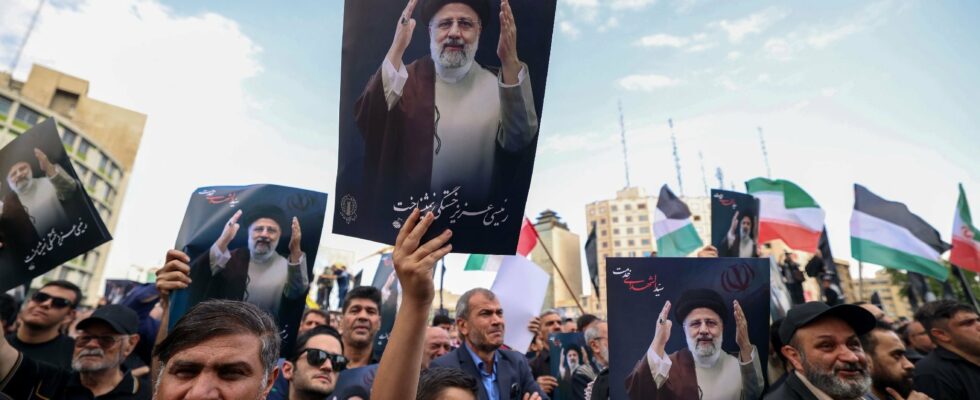The international scene will soon – once again – have its eyes fixed on Iran. Six candidates, most of them conservative, were authorized to compete in the June 28 presidential election intended to replace Ebrahim Raïssi, who died in a helicopter accident in May 2024, according to the announcement made this Sunday, June 9 by the Ministry of the Interior. Appointed urgently, the interim president, Mohammad Mokhber, 68, is responsible for supervising the proper organization of the poll initially planned for spring 2025.
The candidates were selected by the Council of Guardians of the Constitution, an unelected body dominated by conservatives and responsible for overseeing the electoral process, from among 80 personalities who submitted their candidacy. Among them, four women – but were not qualified, as in each presidential election. “In reality, it is Ali Khamenei (the supreme guide) who decides, because the members of the Council listen to him and are very loyal to him”, specified in the columns of L’Express, Arash Azizi, Iranian historian and journalist. And added: “These elections will not be free and fair, because no election in the Islamic Republic has ever been.”
Among the candidates who will have the opportunity to campaign is the conservative speaker of Parliament and former member of the Revolutionary Guards, Mohammad-Bagher Ghalibaf. Very close to power, he withdrew in 2017 in favor of Ebrahim Raïssi. We also find the mayor of Tehran, Alireza Zakani, and Saïd Jalili, the former ultraconservative negotiator on the nuclear issue. A presidential candidate three times previously, Saïd Jalili claims to have obtained the support of many Raïssi loyalists, some of whom are likely to withdraw in his favor. He is a strong supporter of compulsory hijab.
Also selected were Amir Hossein Ghazizadeh Hashemi, the ultraconservative head of the Martyrs’ Foundation, and Mostafa Pourmohammadi, a former interior minister. The only reformer in the running is Massoud Pezeshkian, an MP from the city of Tabriz (northwest) and former Minister of Health.
The candidacy of Mahmoud Ahmadinejad
On the other hand, the Council disqualified the populist Mahmoud Ahmadinejad, who wanted, at 67, to return to the post of president which he occupied from 2005 to 2013. The former ultraconservative head of state – whose mandates were marked by strong tensions with the West over the Iranian nuclear program – had already been rejected in the presidential elections of 2017 and 2021. Another veteran of the Islamic Republic, Ali Larijani, former president of Parliament and considered a moderate, was also rejected. According to the British daily The Guardian, the validation of his candidacy would have been a “test of the relative openness of the council”. The Guardian Council has not publicly justified its choices.
In the 2021 election, this body only selected seven candidates out of the 592 applicants, invalidating many reformist and moderate personalities. Which opened the way for Ebrahim Raïssi, the candidate from the conservative and ultraconservative camp, easily elected in the first round. Only 49% of Iranian voters participated in this election, the lowest rate for a presidential election since the Islamic Revolution of 1979. Note that many Iranians are discouraged by the lack of political diversity and disappointment still seems to be in order for this election. new ballot, with one fewer candidate than three years ago.
No change in sight?
“Reformists have lost their appeal in urban areas, where many Iranians do not believe that the mullahs’ regime, backed by the Islamic Revolutionary Guard Corps, will tolerate social change,” analyzes The Guardian. Elected for four years, the president is not the head of state, because this role falls to the Supreme Guide. The Iranian president heads the government, participates in international conferences, but does not have the last word. “The disappearance of Raïssi will in no way call into question the rapprochement with Russia and China, the toughening on nuclear power”, still believes The Guardian.
On this aspect, moreover, the International Atomic Energy Agency (IAEA) adopted a resolution on June 5 formally calling Tehran to order, while the Iranian nuclear program is gaining momentum. However, the Iranian newspaper Javan, close to power, declared to see it as a form of “interference by European countries in the election: “Europe is launching the presidential campaign in order to help a particular faction”, thus translated International mail.
One thing is certain: this election will take place in a very degraded socio-economic situation. Because of international sanctions, but also poor internal management, inflation is hitting Iran hard, affecting the quality of life of its inhabitants. Thierry Kellner, lecturer at the Free University of Brussels and co-author with Mohammad-Reza Djalili of a History of contemporary Iran (La Découverte) described in L’Express “a serious situation for the population, marked by growing impoverishment.” It remains to be seen who will be responsible for improving the situation in the country.
